 In a shocking example of virtual life crashing into real life, a Shanghai online game player stabbed his gaming pal in the chest multiple times after he learned that he had stolen approximately US$870 (£462/€671) from the sale of a powerful “dragon sabre”, jointly owned by both players.
In a shocking example of virtual life crashing into real life, a Shanghai online game player stabbed his gaming pal in the chest multiple times after he learned that he had stolen approximately US$870 (£462/€671) from the sale of a powerful “dragon sabre”, jointly owned by both players.
The “dragon sabre” sword didn’t actually exist in real life – it was an artifact used in the popular online fantasy game, “Legend of Mir 3”, featuring heroes and villains, sorcerers and warriors, many of whom wield enormous swords.
Qiu Chengwei, 41, stabbed competitor Zhu Caoyuan repeatedly in the chest after learning that he had sold his “dragon sabre.”
Chengwei and a friend jointly won their weapon last February, and lent it to Zhu who then sold it for 7,200 yuan (£464/US$872/€673), according to the China Daily.
Qui went to the police to report the “theft” but we can only assume the desk sergeant couldn’t get his head around the notion of something that doesn’t exist being stolen. If you get our drift.
 Still fuming, Chengwei popped around to have a word with Caoyuan who didn’t convince with his promises to pay him for the sword.
Still fuming, Chengwei popped around to have a word with Caoyuan who didn’t convince with his promises to pay him for the sword.
Eventually, Chengwei lost patience and let rip with a real-life knife that was most definitely sharp and very pointy, killing Caoyuan with stab wounds to the chest.
Chengwei gave himself up to police and has already pleaded guilty to intentional injury.
No verdict has yet been announced.
This tragic incident highlights the problems online gamers are having protecting their online property, with some experts suggesting that cyber armour and swords in games should be deemed as private property as they cost players both money and time.
But some legal experts aren’t impressed: “The ‘assets’ of one player could mean nothing to others as they are by nature just data created by game providers,” a lawyer for a Shanghai-based Internet game company was quoted as saying.
 However, online game companies in Shanghai – the city with the most players – are planning to set up a dispute system where aggrieved players can find recourse.
However, online game companies in Shanghai – the city with the most players – are planning to set up a dispute system where aggrieved players can find recourse.
Shang Jiangang, a lawyer with the newly established Shanghai Online Game Association, commented that “the association has drafted some measures to facilitate the settlement of disputes over virtual assets”, adding, “once any cyberweapon stealing occurs, players can report to the operator, which will then sort it out according to the circumstances.”
 Memory card kings Lexar Media have teamed up with videogame big boys, Ubisoft, in a cunning piece of cross-market publicity.
Memory card kings Lexar Media have teamed up with videogame big boys, Ubisoft, in a cunning piece of cross-market publicity.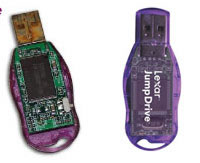 Described as a “major value-add promotion” it looks more like the unexciting equivalent of a magazine freebie cover disk to us, but Theresa Boldrini, Lexar Director of Retail Marketing, can’t hold back her excitement:
Described as a “major value-add promotion” it looks more like the unexciting equivalent of a magazine freebie cover disk to us, but Theresa Boldrini, Lexar Director of Retail Marketing, can’t hold back her excitement: And if all that wasn’t enough, a special Lexar promotion will offer consumers a free Tom Clancy’s Splinter Cell Chaos Theory t-shirt with the purchase of another Lexar product (be still my bearing heart!).
And if all that wasn’t enough, a special Lexar promotion will offer consumers a free Tom Clancy’s Splinter Cell Chaos Theory t-shirt with the purchase of another Lexar product (be still my bearing heart!). Microsoft has agreed – with all the enthusiasm of a child being made to eat spinach – to adopt all the “main changes” requested by the European Commission to its new version of Windows without Media player components.
Microsoft has agreed – with all the enthusiasm of a child being made to eat spinach – to adopt all the “main changes” requested by the European Commission to its new version of Windows without Media player components. Horacio Gutierrez, a lawyer for Microsoft, was clearly not too happy, telling Reuters that the company has “some misgivings about the chosen name, as we fear it may cause confusion for consumers about the product, but we will adopt the Commission’s name in order to move forward and accelerate the pace of the implementation process.”
Horacio Gutierrez, a lawyer for Microsoft, was clearly not too happy, telling Reuters that the company has “some misgivings about the chosen name, as we fear it may cause confusion for consumers about the product, but we will adopt the Commission’s name in order to move forward and accelerate the pace of the implementation process.” And there’s more! Microsoft are also in disagreement with the EU over plans to appoint a trustee to monitor Microsoft’s compliance (or the complete lack of) – if the company fail to comply with the Commission’s decisions, they could face a daily slapdown of up to US$5 million – the equivalent of a cup of coffee in Bill Gates’ world.
And there’s more! Microsoft are also in disagreement with the EU over plans to appoint a trustee to monitor Microsoft’s compliance (or the complete lack of) – if the company fail to comply with the Commission’s decisions, they could face a daily slapdown of up to US$5 million – the equivalent of a cup of coffee in Bill Gates’ world. With a long parp on their PR trumpets, 3 notched up another first with the launch of “over-the-air” real-time multiplayer games over their network.
With a long parp on their PR trumpets, 3 notched up another first with the launch of “over-the-air” real-time multiplayer games over their network. These console-esque games are being supported on the 3 network by the Mophun gaming engine that is being supplied to 3 by Synergenix.
These console-esque games are being supported on the 3 network by the Mophun gaming engine that is being supplied to 3 by Synergenix.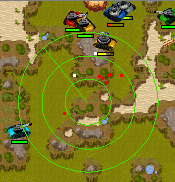 The announcement of these advanced handheld games would suggest that 3 is pro-actively targeting the lucrative console market, and looking to lure potential Gizmodo, DS and PSP customers.
The announcement of these advanced handheld games would suggest that 3 is pro-actively targeting the lucrative console market, and looking to lure potential Gizmodo, DS and PSP customers. MTV in Germany has been demonstrating an interactive TV portal that combines satellite and broadband services.
MTV in Germany has been demonstrating an interactive TV portal that combines satellite and broadband services.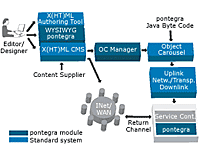 MTV is using Alticast for the technical implementation and broadcast of the interactive service.
MTV is using Alticast for the technical implementation and broadcast of the interactive service. Unconfirmed reports are suggesting that Virgin Electronics, the consumer electronics division of Virgin, have become an early digital music casualty with the division discontinuing its product line.
Unconfirmed reports are suggesting that Virgin Electronics, the consumer electronics division of Virgin, have become an early digital music casualty with the division discontinuing its product line.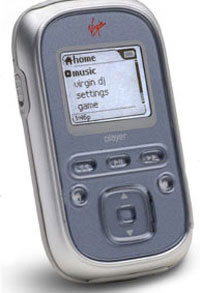 The company had pinned their hopes on the well-reviewed “Virgin player 5GB”, which had the audacity to try and take the iPod mini head-on.
The company had pinned their hopes on the well-reviewed “Virgin player 5GB”, which had the audacity to try and take the iPod mini head-on. Symbian OS anti-virus specialist SimWorks, has announced that it has identified the first virus targeting the platform, that is capable of spreading itself via MMS messages.
Symbian OS anti-virus specialist SimWorks, has announced that it has identified the first virus targeting the platform, that is capable of spreading itself via MMS messages. To add insult to injury, users will be punished financially by the virus, with MMS messages typically costing between $0.25 and $1.00 a pop.
To add insult to injury, users will be punished financially by the virus, with MMS messages typically costing between $0.25 and $1.00 a pop. The good news is that like previous Symbian OS-targeted viruses, users are still required to accept the installation of the virus whether receiving it via Bluetooth or MMS.
The good news is that like previous Symbian OS-targeted viruses, users are still required to accept the installation of the virus whether receiving it via Bluetooth or MMS. Microsoft is teaming up with one of Japan’s hotshot video game developers to create games for its next-generation video game console, XBox2 – a sure-fire sign that it’s determined to grab a fat slice of the Japanese market.
Microsoft is teaming up with one of Japan’s hotshot video game developers to create games for its next-generation video game console, XBox2 – a sure-fire sign that it’s determined to grab a fat slice of the Japanese market.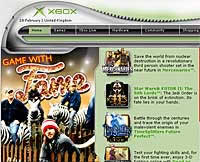 A founding member of former video game software developer Square Co., the 42-year-old is famed for creating the role-playing series, ‘Final Fantasy’, which has shifted more than 60 million copies to date.
A founding member of former video game software developer Square Co., the 42-year-old is famed for creating the role-playing series, ‘Final Fantasy’, which has shifted more than 60 million copies to date. A US appeals panel has challenged new federal rules which require certain video devices to incorporate technology designed to prevent copying digital television programs and distributing them over the Internet.
A US appeals panel has challenged new federal rules which require certain video devices to incorporate technology designed to prevent copying digital television programs and distributing them over the Internet.